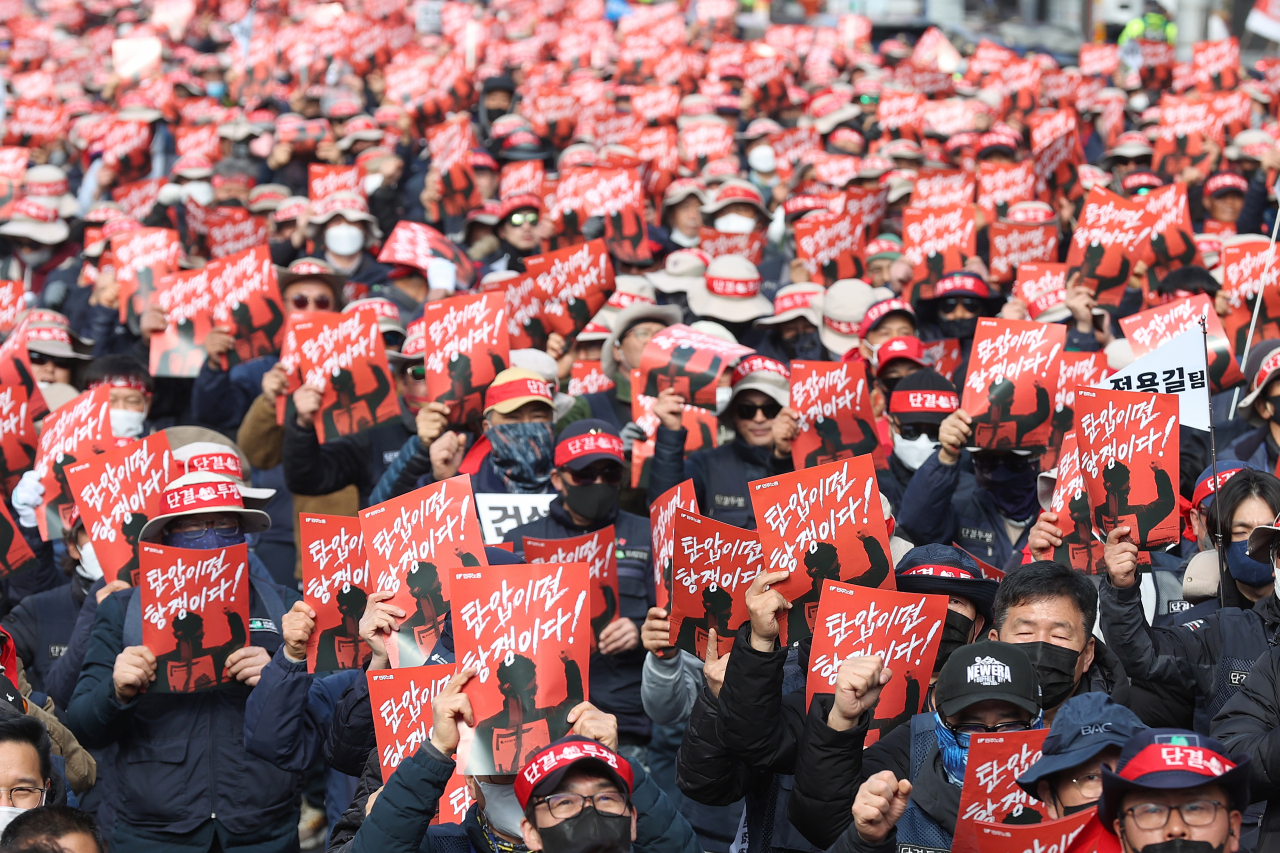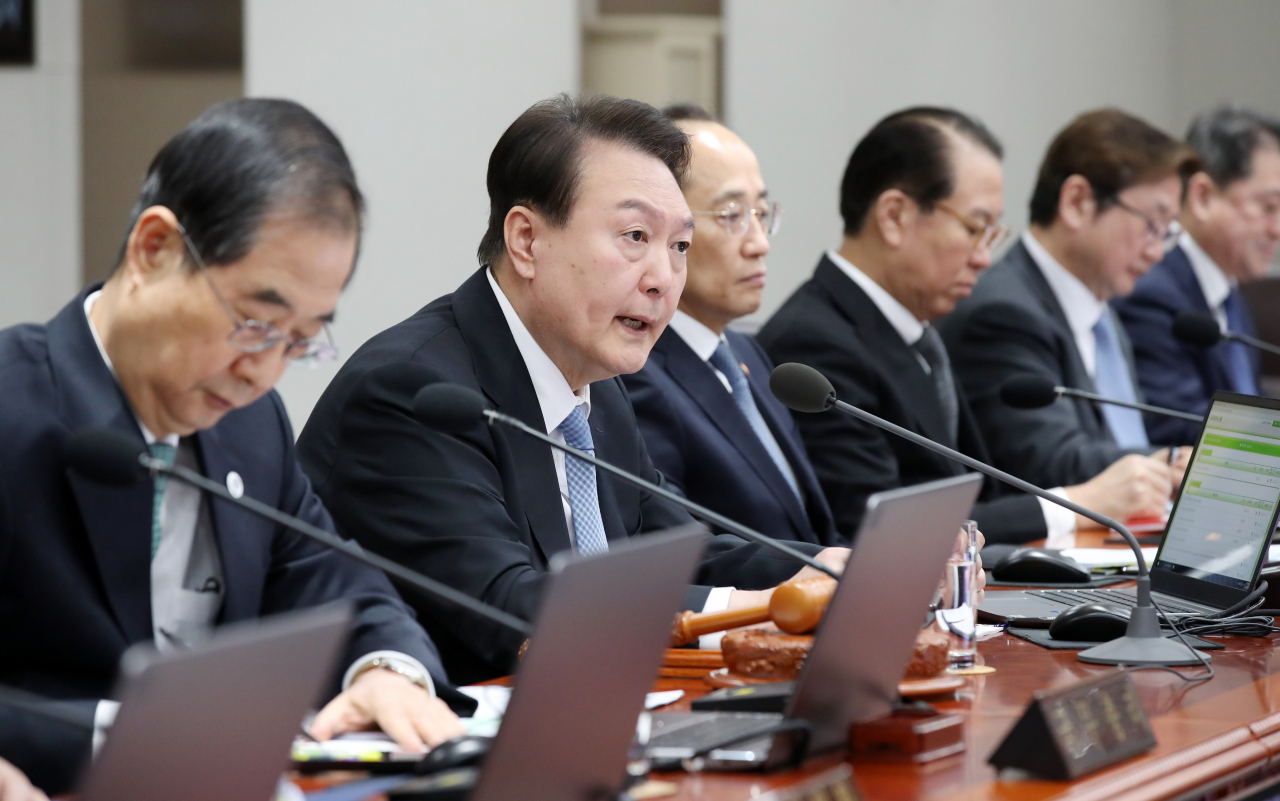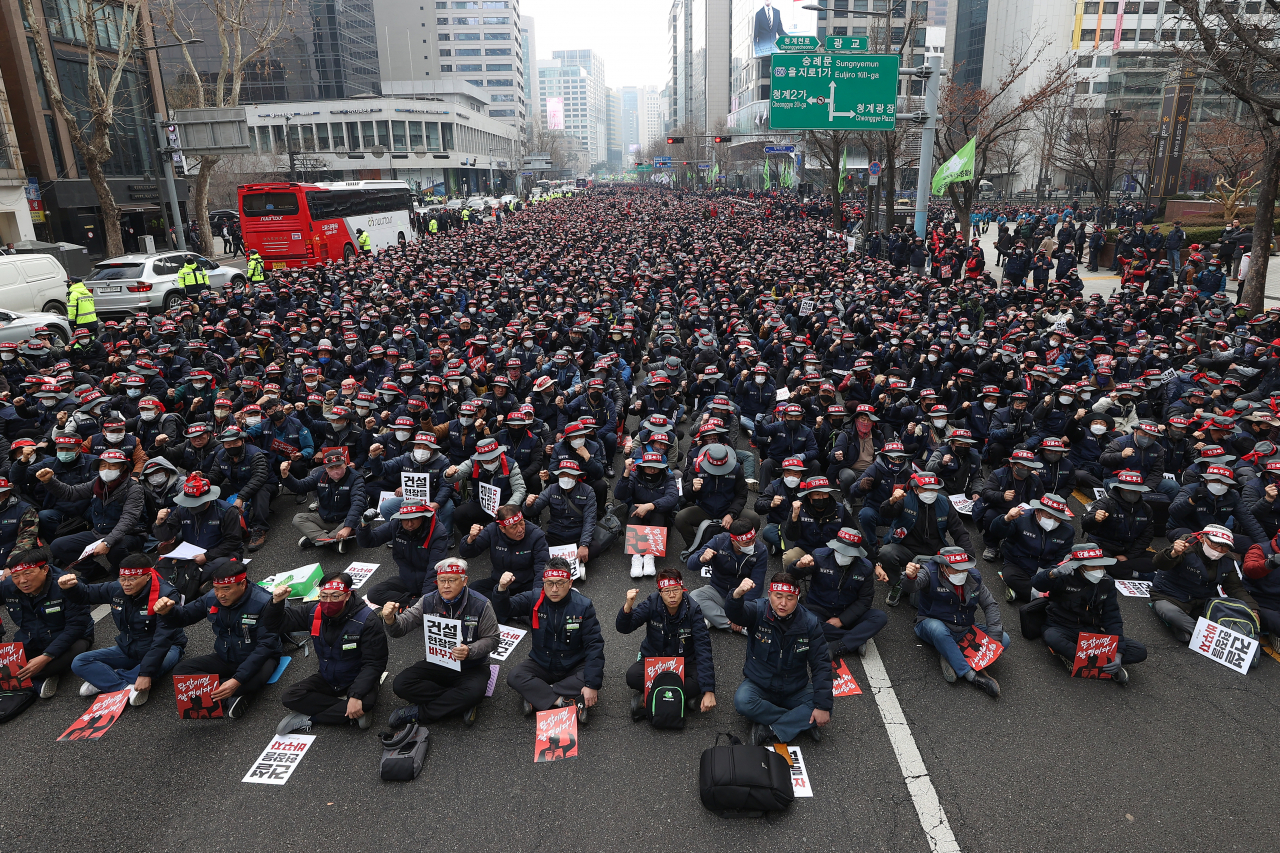 |
Members of the Korean Confederation of Trade Unions hold a resolution meeting and shout slogans condemning Yoon Suk Yeol's government on Sejong-daero in Jung-gu, Seoul, on Feb. 28. (Yonhap) |
Kim, the 65-year-old owner of a construction business-related subcontractor in Yeosu, South Jeolla Province, had to sell his business a few months ago, after years of struggling with a local labor union.
The Yeosu branch of the Korean Confederation of Trade Unions constantly intervened in the hiring process of workers at Kim's company and even told him to fire people they do not like, he said. Whenever the union had internal quarrels, Kim had to watch his workers leave their work behind and join the conflict instead, though he knew that they had also been forced to.
The leaders of the union treat small business owners like himself as servants, he said. Referring to himself as a businessman not interested in politics, Kim said he has become a supporter to President Yoon Suk Yeol’s recent hardline approach to labor unions.
As opposed to his labor-friendly predecessor Moon Jae-in, Yoon, a prosecutor-turned-politician, has been tough on illegal acts committed by labor unions as a wider part of his labor union reforms.
At a recent meeting with his senior officials, Yoon said the polarization of the labor market by unions with strong vested interests is making young and ordinary people's lives more difficult. He told his secretaries to cooperate with the prosecution, the police, the Labor Ministry and the Transport Ministry, to crack down on systematic illegal activities, such as extortion and violence at construction sites.
The government is now pursuing a plan to impose criminal punishment on labor unions if they commit unfair acts, such as violating the rights of other unions or workers, or interfering with normal business operations.
Since December, the police have been conducting a six-month-long special crackdown on illegal acts of violence at construction sites across the country.
During the cargo union strike in late 2022, Yoon went all out, taking the toughest approach to tame the union on strike. This was a rare move for a Korean president who often remained both neutral over conflicts between the industry and the labor, and mindful of laborers who for decades were hailed for their contribution to the nation's democracy.
With Yoon issuing a back-to-work executive order and likening the union's strike with North Korea's nuclear threat, the union, which is affiliated with militant KCTU, the largest labor union umbrella organization in the country, ended the strike after 16 days.
Yoon's war against the union has provided political momentum for the president who narrowly won the election and was suffering from a low approval rating for months due to a series of mishaps.
Yoon's recent rise in approval ratings from the 20-percent range to 40 percent has given him more confidence.
He continued to press the labor union, describing them as a "deep-rooted evil" and, in regard to construction-related union violence, as "keonpok," a word resembling the term "jopok" which is used to denote organized crime.
The president's rating continued to rise, reaching 42.9 percent on March 6, according to the survey firm Realmeter, which said his “response against the union in principle” has aided the rise.
 |
President Yoon Suk Yeol speaks at a cabinet meeting held at the presidential office in Yongsan, Seoul, on Feb. 21. (Yonhap) |
What went wrong?
Kim, the businessman in Yeosu, is not the only one who pins his hopes on Yoon's hardline labor policy. According to a labor lawyer who spoke anonymously, labor unions frequently pressure subcontractors to fire employees they don't like. "If subcontractors do not comply, the union threatens to strike and urges main contractors to terminate contracts with them," the lawyer said. "The union often goes on strike for its own interests, which have nothing to do with the working conditions of the employees, causing harm to both employees and subcontractors."
The lawyer believes that the playing field is tilted in favor of a stronger union.
"During the previous (Moon Jae-in) administration, the government was passive in using public power and the police did not intervene even when there was violence from the union."
In 2018, about 40 unionized workers of the KCTU broke into the office of Yoosung Enterprise Co. in Asan, South Chungcheong Province, and assaulted an executive surnamed Kim for around 40 minutes, inflicting serious injuries. Despite the presence of police outside the building, they did not intervene in the violence. "Kim suffered a panic attack because he knew that no one could help him," the lawyer said.
A survey by the Korea Specialty Construction Association from Dec. 29 to Feb. 10 found that 67 percent of construction sites had suffered three or more instances of unfair practice by labor unions. The most common issues were the compulsory recruitment of labor union members (17.58 percent), mandatory payment for full-time unionists (17.58 percent) and a monthly fee for construction cranes (17.58 percent).
Labor unions in South Korea were formed under the influence of the June 1987 uprising and workers' struggle, thanks to the efforts of people who worked tirelessly for workers’ rights, including Jeon Tae-il, who committed suicide in 1970 to protest poor working conditions.
Over the past few decades, their members have increased to nearly 3 million, and they have wielded great power in the labor market and politics. However, two of the larger unions, the KCTU and the Federation of Korean Trade Unions do not represent the labor force as a whole. The unionization rate stands at only 14 percent out of the nation’s total workforce. There is a strong tendency towards only the voices of powerful unions such as large corporations being reflected. The people outside of the unions, or 86 percent of the work force, refer to the workers inside as the “noble union.”
Han Seok-ho, secretary-general of the Jeon Tae-il Foundation and a former member of the Korean Confederation of Trade Unions, said at a recent meeting, “The public is not taking our side. Labor outside the fence is angry about the labor inside the fence.”
 |
Members of the construction union of the Korean Confederation of Trade Unions hold a pre-meeting before marching in the direction of Sungnyemun near Jonggak Station in Jongno-gu, Seoul, on Feb. 28. (Yonhap) |
War carries on
The police announced on March 9 that they had conducted a special crackdown on illegal acts of violence at construction sites across the country for about three months from December. As a result, 2,863 people were caught and 102 of them were sent to the prosecution.
The police said that 2,153 people were caught extorting money or valuables in the name of extra wages, accounting for 75 percent of the total. In addition, there were 302 cases of obstruction of work and 284 cases of hiring union members and forcing them to use equipment which accounted for 11 percent and 10 percent, respectively.
The labor unions are also preparing to fight back against the Yoon government.
The KCTU has announced a general uprising in May and a general strike in July.
On Feb. 28, members of the construction union from across the country organized a large-scale rally in downtown Seoul to protest the government's "war on labor unions" at construction sites. According to the police, the event drew around 15,000 people from seven branches under the construction union of the KCTU, who gathered in front of the Seoul Government Complex near Gwanghwamun. The attendees held a pre-resolution meeting and wore red headbands bearing the message "unite, struggle."
During the rally, Yoon Jeong-hyeok, who heads the metal union of the KCTU, addressed the crowd and criticized the Yoon government over its poor treatment of the construction union. He called on the attendees to unite and fight to protect the KTCU and to strive for victory for the workers. The head of the metal union also chanted slogans such as "We can't continue living like this, let's turn the world upside down."
Kim Jong-ho, who heads the Daegu-Gyeongbuk regional headquarters, also criticized the government's handling of construction sites. He claimed that during a time when illegal multi-level operations were rampant, the government failed to comprehend what was happening on the sites and instead had workers come to Gwanghwamun. Kim suggested that the transportation and labor ministers should have worked at the construction sites for over a year to gain a better understanding of the situation.
Lee Heung-seok, a union leader, claims that safety accidents and large-scale accidents have decreased thanks to the union's efforts. "The government does not recognize the benefits of this union and exaggerates the violence on the ground," he said.
Experts suggest that the government should approach its efforts to eliminate illegal practices in the construction industry with more care and sensitivity.
“Yoon’s push for cracking down on the union has significance,” said Choi Myeong-ki, an industrial field professor at the Human Resources Development Service of Korea.
“But if it is too extreme, it may not match the reality,” he said. “If the government only beats the unions without understanding the situation on the construction sites, it might harm subcontractors who are struggling between large companies and unions.”







